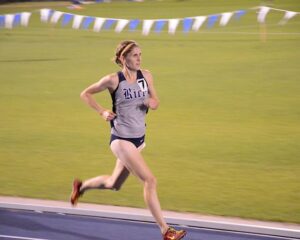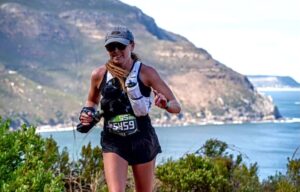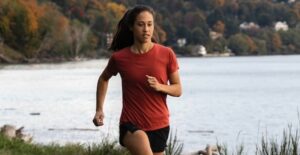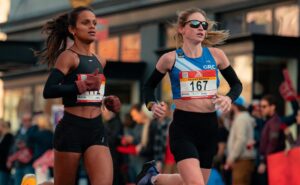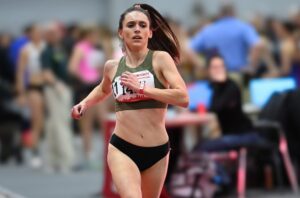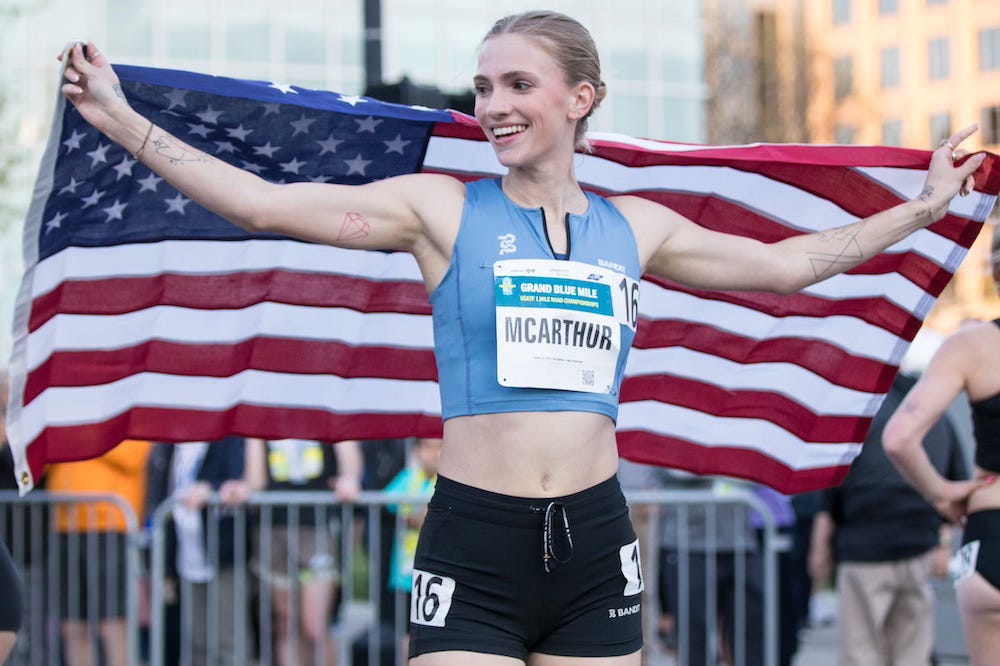
Rachel McArthur first began to grasp how fit she was when she hopped in a 5,000m race at William & Mary at the beginning of April. It was her first race back after undergoing surgery eight months earlier. Following instructions from coach Ben Thomas, she paced some Virginia Tech runners through 3K, and then picked up the pace. After averaging 3:15/kilometer for the first 3K, she averaged 2:59/kilometer for the last 2K. Despite treating the race as a workout, her winning time, 15:43.91, was a personal best by nearly 10 seconds.
Two weeks later, McArthur, 24, lined up for her first 1500m of the season, at the Wake Forest Invitational. The event attracted a mix of pro runners and top collegians; the only problem was that she didn’t get to race them. Though she and Thomas knew she belonged in the top heat, her 4:13.25 PR from 2021 landed her in the second-fastest heat, and they were unable to convince the meet organizers to make the switch.
Unfazed, McArthur followed rabbit Presley Weems early, before taking off in the second half. She won her heat by nearly four seconds, running 4:07.48, a massive PR. And then she got to watch the rest of the top 1500m runners duke it out in the next heat, where her time would have placed her fourth.
It wasn’t until the USATF 1 Mile Road Championships on April 23 in Des Moines, Iowa, that McArthur finally got to race athletes who could push her. The race couldn’t have gone better. McArthur kicked to a win, running 4:32.20, ahead of Anna Camp Bennett, who took second in 4:33.67. McArthur forgot the race was a national championship event until someone handed her an American flag. Five years after winning the USATF U20 1500m title, McArthur earned her first senior national title.
Four days later, McArthur and Camp Bennett raced again, in the 1500m at Drake Relays, also in Des Moines. That time Camp Bennett got the edge, winning 4:07.82 to 4:08.39. But in four races over the course of a month, McArthur showed that not only is she back after several years of struggle, she’s running at a new level.
An uneven collegiate career
McArthur says she didn’t train much in high school or take the sport seriously. “I don’t think I ever ran more than 20 minutes on my own,” she told Fast Women. “I just worked out.” But she had a lot of success. McArthur was a seven-time Virginia state champion for Patriot High School, won the 800m at New Balance Nationals Indoor and the Brooks PR Invitational as a senior in 2017, and she graduated with PRs of 2:05.68 (800m) and 4:41.67 (1600m).
McArthur began her college career at Villanova, and at first, she was hesitant to fully commit to the sport. “I thought, ‘I’m young, I have time,’” she said. At the end of her first year, she won her USATF U20 title and, as a sophomore, she helped her team finish fourth in the distance medley relay at the NCAA Indoor Championships, and she won the Mid-Atlantic Regional in cross country. But outside of running, McArthur wasn’t happy at Villanova, and she decided to transfer to the University of Colorado after her sophomore year.
At CU, McArthur started taking the sport more seriously. McArthur estimates that at most, she ran 40 miles per week at Villanova. At CU, a more distance-focused school, she averaged around 75 miles per week, sometimes more, and got to up to 100 a couple times over the summer. “That was sort of the culture,” she said. “But now that I have more experience, my motto for a lot of things is, ‘Just because you can does not mean you should.’”
McArthur is glad she experienced both ends of the spectrum, and now her training falls somewhere in the middle. She expects she’ll do more once she’s been back training for longer, but she’s currently running about 50 miles per week and doing a lot of cross training.
As a fifth-year senior, McArthur finished fourth in the NCAA indoor mile and earned All-America honors. But she was also running through pain in her heel every day. And around the time McArthur left CU in 2022, cross country and track & field coaches Mark Wetmore and Heather Burroughs, along with dietitian Laura Anderson, came under scrutiny for overemphasizing body composition, among other things. “I personally did not have as negative of an experience as a lot of people,” McArthur said. “But I 100 percent can understand why they did and I can completely see where the problems are.”
A tough start to post-collegiate running
After struggling through her final college race, McArthur spent some time at home in Northern Virginia, but after several months, she relocated to Eugene, Oregon, where her boyfriend, professional runner Cooper Teare, was based at the time. She hoped that she would be able to race well enough to get a pro contract, and then she could take some time to heal her injury.
“I was definitely in denial about a lot of different things, primarily because I knew that if I acknowledged how severe my injury was, I needed surgery, and I was not in the financial position to get it,” she said. McArthur had health insurance, but it would not cover the full cost of the surgery and PT.
During that time, McArthur did a lot of soul searching and questioned whether professional running was a realistic path for her. She leaned on Teare, her agent, Isaya Okwiya, and her family. McArthur ultimately decided she had too much potential to stop before she got a chance to push herself enough to see what she could really do.
And a conversation with Burroughs turned out to be the wake-up call McArthur needed. When she heard McArthur was still struggling with the same injury that plagued her at CU, Burroughs told her she needed surgery. And because she got injured at CU, CU would be responsible for covering her related medical expenses. (The NCAA protections for athletes in these types of cases will become even stronger in August.)
Getting all of the necessary approvals took time, but in early August, McArthur underwent Haglund’s deformity surgery in Denver. It took about a month for her to get back to walking. Thomas had begun coaching her at that point, and he was very cautious as he eased her back into running. “I was so frustrated some days,” she said. “He would say, ‘You can shuffle for 30 seconds and then walk for a minute,’ that sort of thing. So it was probably the slowest return to running I’ve ever heard of, honestly.”
Also during that time, McArthur and Teare made the decision to move to Blacksburg, Virginia, to follow Thomas, who had returned to coaching at Virginia Tech after five years in Oregon. In early November, with their pet rabbit, Hachi, in tow, they relocated to McArthur’s home state.
Team SOVA
In Blacksburg, McArthur is part of a new post-collegiate group called Team SOVA. The group has five members: McArthur, Teare, Cole Hocker, Aidan Tooker, and Matt Wisner. They currently have no plans to expand their roster, but when McArthur needs other women to train with, she hops in the Virginia Tech team’s workouts.
Thomas’ training is different from anything McArthur has done before. She describes it as wonky. “I always say if Ben emailed our schedule to a runner, they would have no idea what the training even says,” she said. “There’s just a lot of acronyms, a lot of broken up segments. You could have a workout day that’s like track workout, head to the hills, do hills, get on the Alter-G, get on the bike, go back to the hills. It’s just all over the place. On paper, it probably makes no sense. But, when you do it, you see why it works.”
She credits her recent success to her environment as well, saying that in Blacksburg, she has been able to establish a life outside of running. “I’m just much, much happier as a person,” she said. “I’m moving forward in my life, and I’m getting to pursue something I always wanted to pursue. I don’t feel this tremendous weight on my shoulders. It is a relief to just go to a meet and be really excited, and not sick to my stomach that I’m even there in the first place. It feels nice to enjoy it.”
McArthur has a small contract with Bandit where they cover some of her expenses, and she has done some modeling for them as well. But she’s free to move on if another company offers more support, which is the hope. She has also been working part-time at a local running store.
Thanks to her recent success, she’s no longer having trouble getting into meets. Next up, she plans to race at the LA Grand Prix on May 17 and the HOKA Festival of Miles on May 30. She has her eye on the Trials 1500m “A” standard of 4:06.00 and then seeing how fast she can go. She likes the idea of taking nearly 10 seconds off of her PR this year. “I love seeing the training translating over to the track,” she said. “I also just love when my friends, family, coach, and agent are happy. So it’s just really fun to do big things and then report back.”


